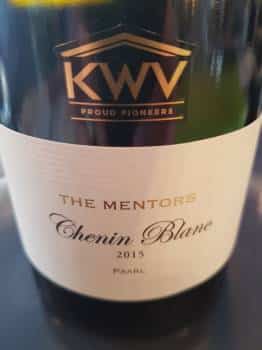KWV The Mentors and its standing in the marketplace
By Christian Eedes, 18 August 2016

1

Head winemaker Johann Fourie has left to be replaced by Wim Truter, who only recently was appointed to head up Fleur du Cap at KWV competitor Distell, while director in charge of global marketing and sales efforts DeBruyn Steenkamp is arranging workshops to brainstorm why KWV’s flagship range The Mentors doesn’t have more of a following in the market, despite winning multiple awards both locally and internationally. “The intrinsics aren’t in question but we’re perceived as corporate and retro,” he says.
Compared to something like the red blend that is The Chocolate Block from Vinimark [correction: The Chocolate Block is made by Boekenhoutskloof and Vinimark is Boekenhoutskloof’s distribution partner – the two companies share some of the same management], The Mentors isn’t nearly as sexy but should it even strive to be so? Opus One from Rothschild and Mondavi and Grange from Penfolds are successful ultra-premium brands but you wouldn’t necessarily call them “sexy”.
No doubt, KWV has a legacy problem dating from its role as a parastatal of the apartheid government but it’s not impossible to re-invent yourself as demonstrated, for instance, by those German companies who played a central role in the Nazi economy but still continue to trade successfully to this day.
The question is: when is a long history “heritage” and when is it a burden that needs to be jettisoned? One brand that was potentially an icon in the KWV portfolio is obviously Roodeberg but with the wine currently selling for around R65 a bottle and now firmly entrenched in the middle market, it’s difficult to see how the company’s brains trust could successfully reposition it as an ultra-premium offering. Distell, of course, has the same problem with Chateau Libertas.
Regarding The Mentors range specifically, there is perception in some quarters that for all the awards the wines have won, they are still stylistically too safe, which is to say calibrated to commercial, popular taste. This is perhaps not entirely fair as the market is not monolithic and not everybody wants to drink “orange” wine or anything else too alternative.
However, it does have to be acknowledged that The Mentors story is not well told. Consumers at the fine wine end of the market care about a sense of place and the personalities behind the making of the wine but the brand unfortunately comes across as unremarkable and impersonal. In addition, the actual packaging is particularly non-descript and does not do a good job of positioning the wine for the uninitiated consumer (the white wines selling for R175 a bottle and the reds for R280).
The observation was made by Cathy van Zyl MW that “you can’t be everything to everybody” – an organisation seeking to establish a brand on the scale of Coca-Cola needed to be specific in its purpose with this backed up by a suitably large marketing budget. For those wanting to be innovative and less mainstream, they could afford to be more nimble and flexible in the market place but necessarily would have to accept smaller economies of scale.
In respect of the above, it can be argued that The Mentors offering is muddled, the range including wines in very traditional categories like Chardonnay and Sauvignon Blanc but also wines from fringe varieties like Grenache Blanc and Verdelho.
To some extent, KWV’s problem with Mentors is that it is perceived as a purveyor of entry-level and mid-market products who now wants to operate at the luxury end of the market, consumers reluctant to trade up. A far more effective strategy is to establish pinnacle brands first and then get consumers to trade down, an obvious case study in the local industry being Kanonkop, this producer first establishing the Estate range (including Paul Sauer) and then growing its everyday drinking Kadette range.
Boekenhoutskloof as a company also deserve praise for how it operates, the mothership carefully orchestrating very successful ranges at all levels of the market, any connections in the mind of the consumer between The Wolftrap, Porcupine Ridge, Boekenhoutskloof and Porseleinberg only being positive.
Ultimately, however, the success of Mentors might come down old-fashioned market activation, which is to say more communication with both trade and consumer: more dinners, more tastings, more social media. In a word, more boots on the ground.







Peter May | 18 August 2016
I agree.
I think the prominnece of the KWV branding does no favours, KWV is not associated, in the UK at least, with the kudos I understand it has in RSA